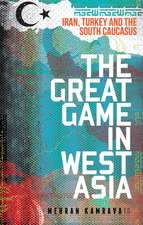Governance for Harmony in Asia and Beyond: Comparative Development and Policy in Asia
Editat de Julia Tao, Anthony B. L. Cheung, Martin Painter, Chenyang Lien Limba Engleză Paperback – 21 dec 2015
The book argues that in Western political thought - which sees politics as primarily concerned with resolving social conflicts and protecting individual rights - the concept of harmony has often been neglected. In contrast, since earliest times harmony or ‘he’ has been a profound theme in Confucian thought, and current leaders of many East Asian governments, and the Chinese government, have explicitly declared that the realisation of a harmonious society is their aim. The book also assesses how harmony is pursued, jeopardized or deformed in the real world of politics, based upon empirical analysis of a variety of different cultural, social and political contexts, including: China, Hong Kong, Singapore, Malaysia, Singapore, Vietnam, Denmark, Latin America and the Scandinavian countries.
It shows how harmony as an organizing concept can help to promote new thinking in governance, and overcome problems of modern-day governance like distrust, adversarial conflicts, hyper-individualism, coercive state intervention, and free-market alienation. It also discusses the potential problems posed by the pursuit of harmony, in particular in the grave threat of totalitarianism, and considers how these risks could best be mitigated.
| Toate formatele și edițiile | Preț | Express |
|---|---|---|
| Paperback (1) | 416.22 lei 6-8 săpt. | |
| Taylor & Francis – 21 dec 2015 | 416.22 lei 6-8 săpt. | |
| Hardback (1) | 1068.18 lei 6-8 săpt. | |
| Taylor & Francis – 14 dec 2009 | 1068.18 lei 6-8 săpt. |
Din seria Comparative Development and Policy in Asia
-
 Preț: 288.49 lei
Preț: 288.49 lei -
 Preț: 419.54 lei
Preț: 419.54 lei - 12%
 Preț: 299.52 lei
Preț: 299.52 lei -
 Preț: 325.94 lei
Preț: 325.94 lei -
 Preț: 346.03 lei
Preț: 346.03 lei -
 Preț: 412.27 lei
Preț: 412.27 lei -
 Preț: 416.22 lei
Preț: 416.22 lei - 28%
 Preț: 850.37 lei
Preț: 850.37 lei -
 Preț: 489.26 lei
Preț: 489.26 lei -
 Preț: 384.59 lei
Preț: 384.59 lei - 26%
 Preț: 821.46 lei
Preț: 821.46 lei -
 Preț: 389.38 lei
Preț: 389.38 lei -
 Preț: 264.59 lei
Preț: 264.59 lei -
 Preț: 436.14 lei
Preț: 436.14 lei -
 Preț: 436.14 lei
Preț: 436.14 lei - 42%
 Preț: 193.76 lei
Preț: 193.76 lei - 22%
 Preț: 329.91 lei
Preț: 329.91 lei - 13%
 Preț: 334.92 lei
Preț: 334.92 lei -
 Preț: 422.86 lei
Preț: 422.86 lei -
 Preț: 381.77 lei
Preț: 381.77 lei
Preț: 416.22 lei
Nou
Puncte Express: 624
Preț estimativ în valută:
79.64€ • 82.99$ • 65.94£
79.64€ • 82.99$ • 65.94£
Carte tipărită la comandă
Livrare economică 03-17 aprilie
Preluare comenzi: 021 569.72.76
Specificații
ISBN-13: 9781138991989
ISBN-10: 1138991988
Pagini: 368
Ilustrații: 3 black & white illustrations, 4 black & white tables, 3 black & white line drawings
Dimensiuni: 156 x 234 x 20 mm
Greutate: 0.45 kg
Ediția:1
Editura: Taylor & Francis
Colecția Routledge
Seria Comparative Development and Policy in Asia
Locul publicării:Oxford, United Kingdom
ISBN-10: 1138991988
Pagini: 368
Ilustrații: 3 black & white illustrations, 4 black & white tables, 3 black & white line drawings
Dimensiuni: 156 x 234 x 20 mm
Greutate: 0.45 kg
Ediția:1
Editura: Taylor & Francis
Colecția Routledge
Seria Comparative Development and Policy in Asia
Locul publicării:Oxford, United Kingdom
Public țintă
PostgraduateCuprins
Part 1: Introduction 1. Why Governance for Harmony? Part 2: Governance for Harmony in East--West Traditions 2. The Confucian Conception of Harmony 3. Harmony as a Guiding Principle for Governance 4. Harmony in Government Part 3: The Quest for Harmony in Government in Asia 5. Harmony, Conformity or Timidity? Singapore’s Overachievement in the Quest for Harmony 6. Harmony in Government--Society Governance: Problems, Challenges and Prospects in Malaysia 7. Risks in Adopting Modernization as the Way to Build a Harmonious Society in Modern China 8. Governance for Harmony: Challenges for Public Service Delivery Reform in China and Vietnam 9. Restoring Governability in Hong Kong: Managing Plurality and Joining Up Governance Part 4: The Quest for Harmony Beyond Asia: Interplay of Culture and Institution from Confucian and Liberal Perspectives 10. Open Politics and Disharmony - Rockman, Bert A. 11. Disharmony and Civil Society: A View from Latin America 12. Consensual but Not Confucian: Resolving the Paradox of Consensual Politics in Scandinavia 13. Harmony through Network Governance? 14. Can the Confucian Way Lead Us out of the Paradox of Trust in Democracy? 15. Propriety, Law and Harmony: A Functional Argument for the Rule of Virtue 16. Xunzi’s Vision of Society: Harmony by Justice 17. Concordia versus Pax: The Impact of Eastern Governance for Harmony on Western Peace Concepts
Descriere
In the context of increasingly multi-religious, multi-racial and multi-ethnic modern societies, the achievement of harmony is emerging as a major challenge. This book examines the idea of harmony, and its place in politics and governance, both in theory and practice, in Asia, the West and elsewhere.










